| |
“One of my favourite war stories, hands down. Billy Wilder and Charles Brackett wrote their own story for it. It doesn’t follow history. They came up with their own way. It’s not even a very credible version of Rommel, either, but it’s a fantastic version of Rommel.” |
| |
Quentin Tarantino* |
Before I get going on the review itself I should probably note that while I’m always looking to avoid major spoilers, in this case even outlining the story setup in any detail means delivering a few by default. Five Graves to Cairo is littered with unexpected twists and story turns and manages to build tension even in its opening scenes by somehow getting us to worry about what may or may not happen to characters that we’ve only just met. Thus, if you’ve never seen the film and want to go in cold then I’d hop to the tech specs or even the final summary at the bottom of the page, where I’ll give a brief and spoiler-free overview of why you should absolute see this film and get your hands on this disc.
For those who’ve chosen to stay with me, how about this for an opening scene? In the wake of a heavy defeat at Tobruk at the hands of the German Army’s renowned Afrika Korps, a lone British tank rolls forward relentlessly through an empty desert landscape, climbing and descending any dunes in its path without ever modifying its speed. When the camera moves inside it seems clear that the crew are all dead and that the driver has collapsed in such a way that his foot has become jammed on the accelerator pedal. Then one of the soldiers unexpectedly stirs and tries in vain to revive his comrades and free the driver’s foot, but to no avail. A short while after the tank interior starts filling with exhaust fumes, and the survivor climbs halfway through the top hatch and promptly passes out. When the tank mounts the crest of another dune, the jolt tosses the man onto the sand below, and although the fall wakes him, he is too weak to catch up to the rapidly departing vehicle and falls to the ground in a state of exhaustion. The camera then moves in to a big close-up of his army name tag in a shot that that has a dual purpose – not only does it reveal the man’s name to be J. J. Bramble (we’ll soon discover that the first J is for John and that he’s a British Army lieutenant), but it’s designed to be memorable enough for us to recall it later when it that name tag plays a significant role in the plot. There is, I should note, a lot of smart but subtle foreshadowing of this sort, with objects shown or information casually dispensed that turn out to have considerable significance later.
A weak but desperate Bramble eventually clambers to his feet and stumbles gamely on, by chance arriving at the small and bombed-out town of Sidi Halfaya. Its only surviving building is a hotel with the welcoming name The Empress of Britain, which is run by an Egyptian named Farid (Akim Tamiroff) and has only one remaining staff member in the shape of a young French woman known as Mouche (Anne Baxter). By the time Bramble reaches it, sunstroke is causing him to hallucinate and believe he is reporting to British military commanders, unaware of where he actually is and that the beleaguered British have beaten a rapid retreat. The concerned Farid tries to explain this to him whilst attempting to pour water down his throat, to which Bramble responds by collapsing on the floor. Just as he does so, the sound of approaching vehicles announces that the advancing German Army is almost at the doorstep. “Our new guests,” proclaims Mouche with mix of world-weary cynicism and oddly hopeful anticipation.
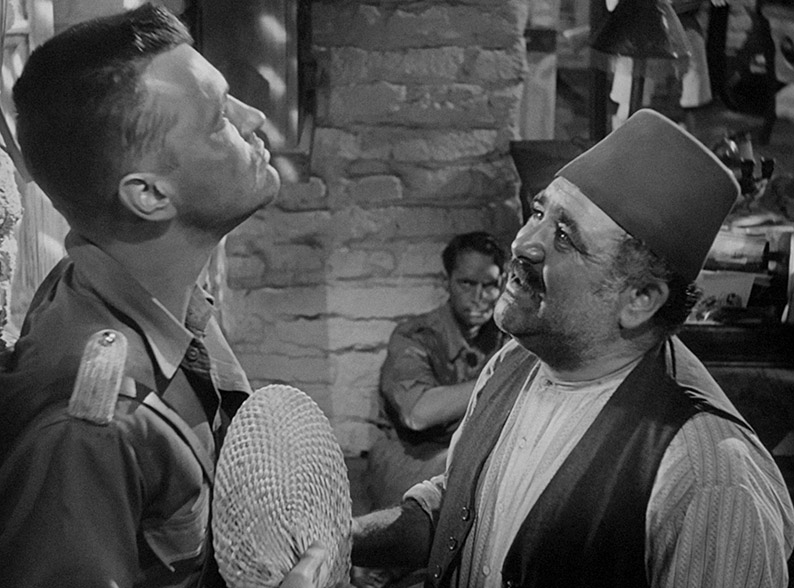
Two things quickly become clear, that Farid is sympathetic to the British and concerned about Bramble’s fate, and that Mouche cares little about Bramble’s survival and is more concerned about the danger any attempt to shield him would put her in. Farid thus hauls the unconscious soldier behind the reception desk just in time to conceal his presence from German officer Lieutenant Schwegler (Peter van Eyke), who strides in and immediately starts making preparations for the arrival of his commander. The brusque efficiency with which he carries out this task marks him as an officer who knows his job and does it well, but the fact that he has written information on each of the hotel personnel seems to be taking the famed German efficiency a slightly odd step too far. Stranger still is his frustration at the news that hotel’s Alsatian waiter Paul Davos was killed in by a German air raid. Is he worried that this could affect the quality of service available to his commander? If so, then he’s either a very conscientious officer or one who lives in fear of displeasing his superior.
During the course of Schwegler’s conversation with Farid, Bramble regains consciousness and is twice almost exposed, only avoiding discovery through a combination of his own quick wits and some wily behaviour on the terrified Farid’s part. He eventually escapes his hiding place, and by the time Farid and Mouche come across him again he’s in the staff quarters and dressing in the clothes of the dead waiter, clothes that include an orthopaedic shoe that the Davos wore due to his club foot. While Farid continues to worry about the danger this impersonation could land them all in, Mouche refuses to go along with the plan, expressing her contempt for the British for abandoning her countrymen during the famed evacuation at Dunkirk and scorning their unkept promises to return. When Bramble lays a nifty bit of emotional blackmail on her, however, Mouche’s hostility towards him softens a little, and when Schwegler enters the room and demands to know who this man is, she backs his story that Davos survived the bombing raid after all and somehow managed to crawl out of the rubble under which he was buried. Once again Schwegler consults his notebook and seems to be convinced that the man standing before him is Davos due to the nature of his disability. The film then pulls a fast one on the audience (and the lieutenant, as it happens) when Schwegler asks Bramble to accompany him for “a little chat downstairs” and en route quietly congratulates him for how well he plays his part. “You know, I would almost believe you were a waiter,” he remarks. Bloody hell, I remember thinking on my first viewing at this point, that little deception was quickly rumbled. So what happens now? It’s then that we meet Schwegler’s famed superior in the shape of Field Marshall Erwin Rommel (Erich Von Stroheim), to whom the nervous Bramble is introduced, and it becomes clear from the conversation that follows that Davos was a German informant during the British occupation, one Schwegler and Rommel have never met in person and only know from the notes in Schwegler’s little black book. Bramble thus goes in a heartbeat from facing likely execution to having possible access to enemy plans and even being in a position to assassinate its most feared and respected military officer. But before he can take any action there’s the mystery of a certain Professor Cronstaetter that Rommel is keen for the British to know nothing about. And what are the five graves mentioned by Rommel that appear to be crucial to his future plans?
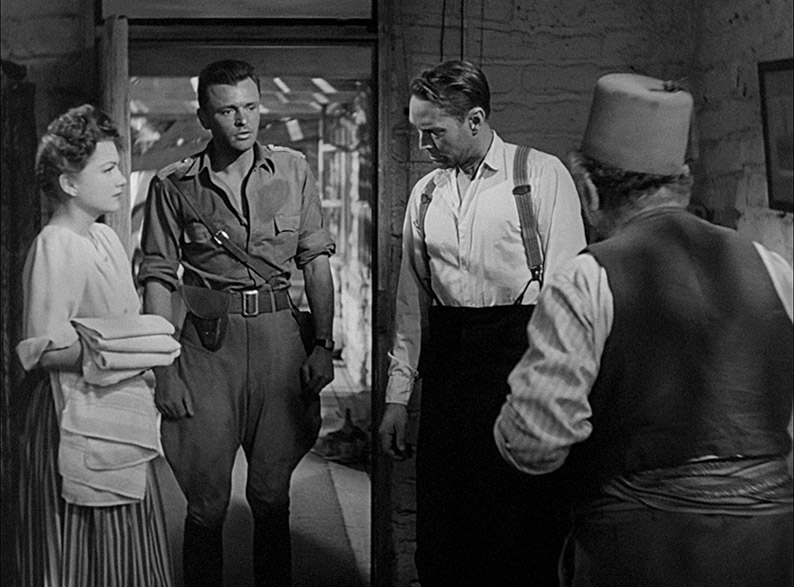
The sheer density of incident in these early scenes belies the fact that it is essentially all setup for what follows, but as is eloquently pointed out by Adrian Martin in his commentary, the thrust of the plot and the goals of the central characters keep shifting as the story unfolds, which makes almost plot development a setup for something else. Having adopted this false identity and ingratiated himself with Rommel and Schwegler, for example, Bramble then sets about stealing a pistol from cheerful Italian officer General Sebastiano (Fortunio Bonanova) with the intention of assassinating Rommel, but his plan is then frustrated by Mouche, who has a personal request to make of the Field Marshall and hides the pistol to prevent his premature death. A chance event sees Bramble recover the gun, but just a few minutes later he makes contact with a captured British officer and is given a different task to complete.
I’m rarely surprised when war-themed British and American films made during WWII have a strong propagandist undercurrent and portray key characters in largely binary terms. After all, when your countrymen are dying by the thousands fighting an enemy that was widely despised on home turf, you’re unlikely to start painting its military representatives in sympathetic colours. Even in modern-day films set in the here and now, a sure fire way of casting a character as irredeemably evil is to make him or her a Nazi – as soon as they start talking about the master race and saluting a swastika you know that they they’re going to be deserving of anything the hero or heroine might later unleash on them. Only after the war did we start to see more nuanced portrayals of German soldiers and officers, most of whom were portrayed as military professionals or reluctant conscripts who fought for their lives and their country but didn’t give a crap about “the stinking party,” as James Mason’s Colonel Brandt described the Nazis in Sam Peckinpah’s Cross of Iron. Yet in Five Graves to Cairo we have a Hollywood movie made and released at the height of the war in which two German officers are portrayed as fully rounded and at one point almost likeable characters. This peaks in a scene in which the German and British officers sit down for dinner in the sort of terribly civilised and friendly meeting of military minds that I have no doubt left front-line infantrymen shaking their heads. Here the British are treated more as dinner guests than the prisoners they technically are, and Rommel even allows them to question him on his skills as a military strategist, skills, it should be noted, that were reported on with a genuine sense of awe by the allied press of the day. Schwegler also appears to show a more human side to his otherwise brusque nature when he offers to help Mouche locate and free her brother from a concentration camp, a promise he later appears to be acting on, though it does seem clear from the off that his actions are driven less by a sudden burst of humanitarianism than a desire to wheedle his way into Mouche’s knickers. Indeed, Mouche is without question the hardest done-by character in the story, deceived by both sides for individually self-serving reasons (though Bramble’s false tales of his family back home are spun quickly to save his own life) and putting her faith in a plan that with the hindsight of history seems doomed to fail from the start. In the end, though, it’s she who proves to be the bravest and most committed of all in a character arc whose conclusion genuinely surprised me on my first viewing.
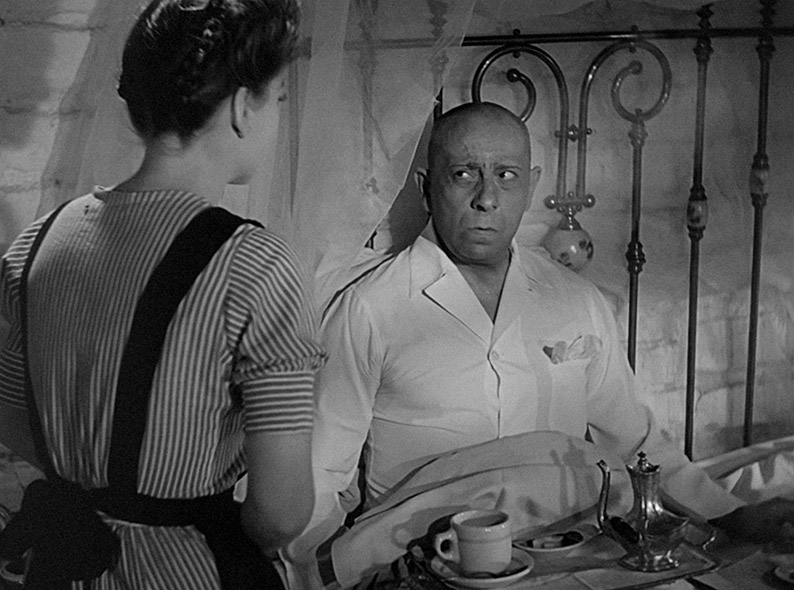
This was only Billy Wilder’s second American film as co-writer and director following the quirky but enjoyable 1942 romantic comedy The Major and the Minor, but it plays like the work of a seasoned professional who already had a string of successes under his belt. It also continued his already fruitful collaboration with screenwriting partner Charles Brackett, with whom he and had previously collaborated on such classics as Ninotchka (for Ernst Lubitsch) and Ball of Fire (for Howard Hawks) and would subsequently write Double Indemnity, The Lost Weekend, A Foreign Affair and Sunset Blvd.. Both men are firing on all cylinders here, from the density of the plotting to the consistently smart dialogue and a string of eminently quotable lines, from Schwegler’s curt warning to Farid that, “Our complaints are brief – we make them against the nearest wall,” to Rommel’s dismissal of Mouche with a stern, “I don’t like women in the morning. Go away.”
Always a key attraction of Wilder’s finest films has always been the casting and performances, and Five Graves to Cairo is no exception on this front. Most of the reviews I’ve read tend to home in on Erich Von Stroheim’s turn as Rommel, with a disproportionately high number of them describing it as “scene-stealing.” I’m not about to contradict this widespread praise for what is a hugely enjoyable portrayal, as Stroheim is absolutely commanding in the role but also able to convincingly drop his authoritarian shield and engage his ‘guests’ when amiably responding to their questions at the dinner table. What I do take issue with is the claim that he is scene-stealing, as this suggests a performance that dominates every scene in which he appears and overshadows the work of his fellow actors, and this is never the case. What makes Stroheim so effective in the role is that he is able to so convincingly capture the essence of a man whose rank, expertise and sense of self-importance (everyone is required to address him as “Your Excellency”) has an instantly subjugating effect on those he meets, but without in any way diminishing the work of his costars. This is especially true of Franchot Tone, an American actor (and early student of The Method) whose performance perfectly counterpoints that of Von Stroheim, being peppered with lovely but natural-feeling little bits of business and an attention to vocal delivery and body language that allows him to completely convince both as British army officer John Bramble and club-footed waiter and operative Paul Davos. There are many who are better qualified than me who can testify to the accuracy or otherwise of Anne Baxter’s French accent, but it never feels obviously false and despite a couple of rapid and crucially timed turnarounds on Mouche’s part, her anger and determination is conveyed with conviction, while her final, late film moment of realisation – captured in a single shot as she walks downstairs as the camera stays locked on her face – is sold almost solely through Baxter’s performance. There certainly shouldn’t be any complaints about the authenticity of German émigré Peter van Eyck’s accent as Lieutenant Schwegler, and like Von Stroheim he is given the opportunity to show the human side of a character it would have been too easy to portray as cartoonishly evil, even if our natural suspicion prevents us from really trusting him when he attempts to befriend Mouche. Armenian actor Akim Tamiroff’s performance as perpetually frightened hotel owner Farid has attracted criticism in some quarters, but despite a few light-hearted moments he avoids playing the role for easy laughs and brings a genuinely touching humanity to the character in the film’s final scenes. Probably the most thankless task falls to Spanish actor Fortunio Bonanova as the opera-loving Italian General Sebastiano, who is the nearest the film comes to a stereotype, his boisterous singing prompting irritating requests for him to cease from Rommel, while his constant cheer and friendliness seem almost designed to present him more as a likeable manipulated pawn of the Germans than a genuine foe. A nod to America’s sizeable Italian-American community, perhaps?
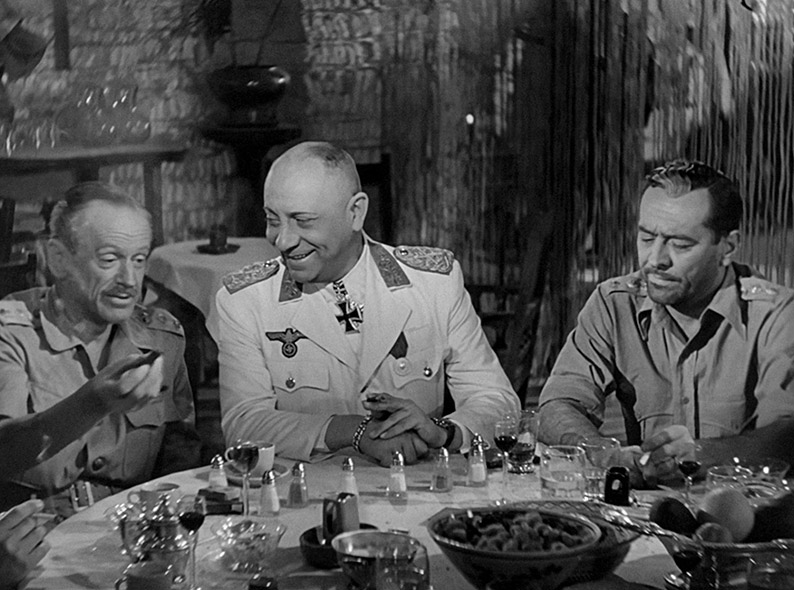
Wilder and Brackett’s Hollywood debut The Major and the Minor was smart and sassy and a great deal of fun, but this exceptional second project for the duo with Wilder in the director’s chair provides a clearer indication of the classics to come. The performances and dialogue are terrific, the direction assured and the storytelling is littered with unexpected (and yes, the occasional expected) twists, none of which seriously strains credibility. The script is even forward-looking enough to usurp a couple of popular tropes that had yet to become identified as such. This is at it most satisfying (more spoilers ahead, so skip ahead if you’re new to the film) when the British officers are brought to the hotel and Farid warns Bramble that they were stationed here before and that one of them, Colonel Fitzhume (an uncredited Miles Mander), knew the real Davos. It’s a situation that in the decades to come would almost always be wrung for every ounce of discomforting tension, but here is used instead to illustrate the professionalism and sharp wit of the British, as Fitzhume calls out to the man he thinks is Davos as he passes and is then warned off from giving the game away by nothing more than a look from Bramble, who then makes smart use of his name tag start to identify himself and open a quiet conversation with the colonel that changes the direction of his immediate plans. It’s just one of many splendidly handled sequences in a film that, although widely recognised as a first-rate war movie and a fine early film from a rightly celebrated writer-director, is one that still tends to be critically overshadowed by the two masterpieces that immediately followed, but absolutely deserves to be discussed in the same breath.
The 1.37:1 1080p transfer on this Masters of Cinema Blu-ray was sourced from a new 4K restoration and it really looks good, with consistently impressive sharpness and picture detail and nicely balanced contrast, punchy blacks and a generous tonal range that doesn’t crush shadow detail or burn out on the highlights. Almost all instances of dirt and damage have been cleaned up, the image is very stable in frame and a fine film grain is visible. I’ve not been able to confirm what materials were used for the restoration, but the presence of reel-change cue markers makes it unlikely it was the original negative, which frankly makes the results achieved here all the more remarkable.
The Linear PCM 2.0 mono soundtrack has the expected range restrictions for a film of this age but is otherwise in good shape, with no obvious damage and only the faintest trace of background fluff detectable if you crank up the volume.
Optional English subtitles for the deaf and hearing impaired have been included.
Audio Commentary by Adrian Martin
A typically informative commentary from Australian film scholar Adrian Martin, who kicks off with style by suggesting that the film’s opening scene is worthy of Samuel Fuller, a spot-on observation that I so wish I had made. He also links aspects of the setup and plotting to that of Nicholas Ray’s cult western Johnny Guitar, something that definitely hadn’t occurred to me but is convincingly argued here. Areas covered include the lead actors, the design of the main set, the complex and unconventionally structured narrative, the subtle suggestion that Rommel was either asexual or gay, the way objects are repurposed during the course of the story, the role of masquerades in Wilder’s filmography, and a good deal more. He reads several quotes about the making of the film from co-screenwriter Charles Brackett’s memoires and identifies changes made by Brackett and Wilder to the play – Hotel Imperial by Lagos Biró – on which it was based, and how this adaptation differs from previous ones. A fine companion to the film.
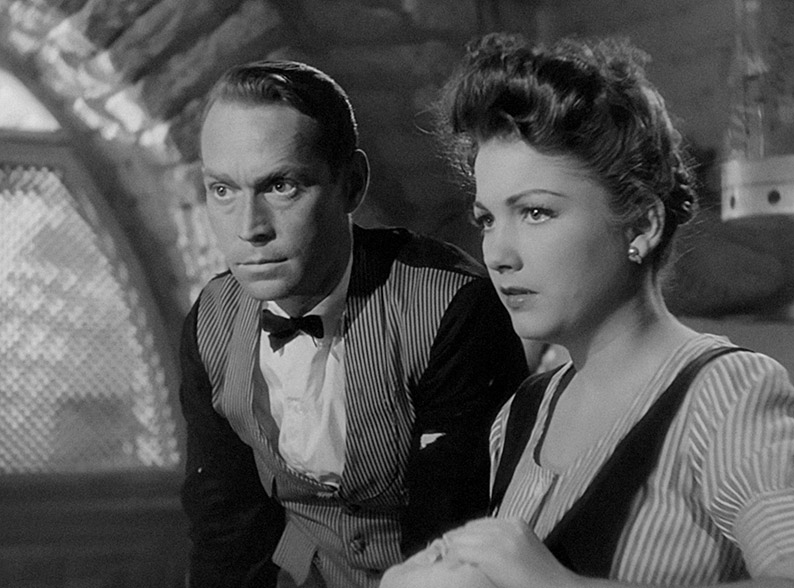
Lux Theatre Radio Adaptation (59:40)
If you’re looking for evidence to stoke the argument that the visuals of any great film are at least as important to the storytelling as the soundtrack, then ladies and gentlemen of the jury, I give you the Lux Radio Theatre adaptation of Five Graves to Cairo, which was recorded and first broadcast in the very same year as the film hit cinemas. I should point out that there’s nothing wrong with the radio play itself, and Franchot Tone, Anne Baxter and Fortunio Bonanova have been brought on board to recreate their film roles, but if you’re a fan of the film then what will likely strike you hardest is an almost complete absence of the sort of nuance and subtlety that the film has in spades. I’d argue that Tone’s performance suffers the most here, stripped as he is of the looks, gestures and body language he makes such excellent use of in the film, while plot points that played out wordlessly on screen have to be explained through often clunky dialogue here. The play’s principal interest thus lies in the way it so clearly illustrates the differing demands of the two mediums, and while substitute actor Otto Preminger does a decent job as Rommel, he’s definitely no Erich Von Stroheim. The production is also quaintly dated by an appeal for American households to save food fat to help the war effort (I have to admit this was a new one on me), one in which host Cecil B. DeMille admits to not being much good in the kitchen, which is why leaves the explanations to “a housewife.” Hmm.
Billy Wilder on His Early Films (11:15)
An extract from the documentary Billy, How Did You Do It? that focuses on Wilder’s move from Germany to Hollywood and his early work there, up to and including Five Graves to Cairo. As the textual introductions reminds us, the full documentary is included on the Masters of Cinema release of The Long Weekend, and given that it runs for over three hours and covers Wilder’s entire career and is partnered with one of the director’s finest films, this is a disc every true film fan should already own or at the very least be planning to buy.
Trailer (2:13)
A by-the-numbers trailer that seems to sell the film as a true story (well, Rommel was real enough) and includes footage from the climactic scenes, so I’d steer clear until after watching the film itself.
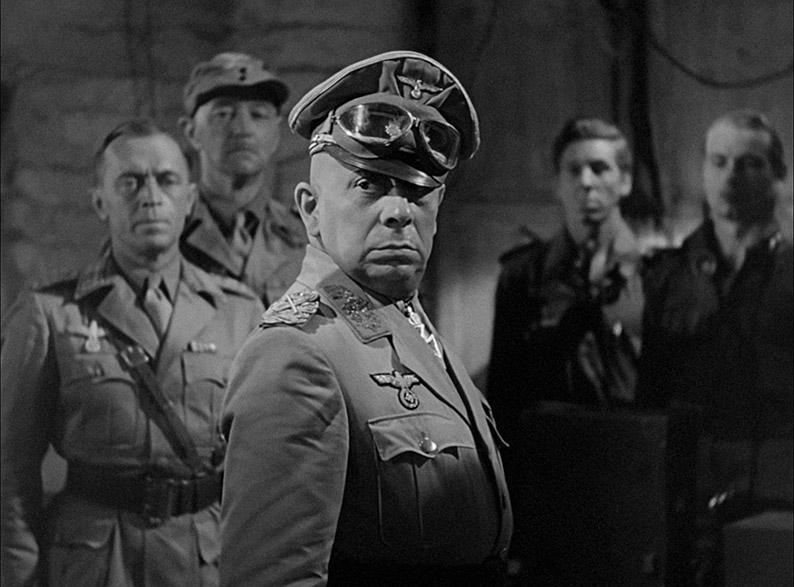
Booklet
Following the main credits there is a thoughtful examination of the film by Richard Combs, who links several key elements to sequences in other Wilder films of note. Next is a detailed piece by writer Simon Ward about the film’s influence on the work of writer-director Quentin Tarantino, who has cited Five Graves to Cairo as one of his favourite films. Finally we have a thorough and engrossing article on the Wilder-Brackett screenwriting partnership by Lincoln Barnett, which was originally published in the 11 December 1944 issue of Life magazine. As ever, the booklet is illustrated with high quality stills and is fronted by a French poster for the film featuring the faces of Erich Von Stroheim as Rommel and Anne Baxter as Mouche, but no sign of the film’s talented leading man (the American poster is the same, for the record).
A riveting, character-driven espionage thriller in war movie clothing (there is surprisingly little action-driven material here), made special by a cracking script from the Brackett-Wilder team, excellent performances, smart direction, and one of the best character introductions I’ve seen in a war film from any period. Peppered with intelligent twists and witty dialogue, it tells a rattling good tale and is for me the movie that really announced Wilder’s as a major moviemaking talent, one that he would go on to make good on time and again. The restoration and transfer on this Blu-ray are first-rate, as is the commentary and the booklet, while the perfectly serviceable radio adaptation helps to make the case for why the film is so good. Highly recommended.
|